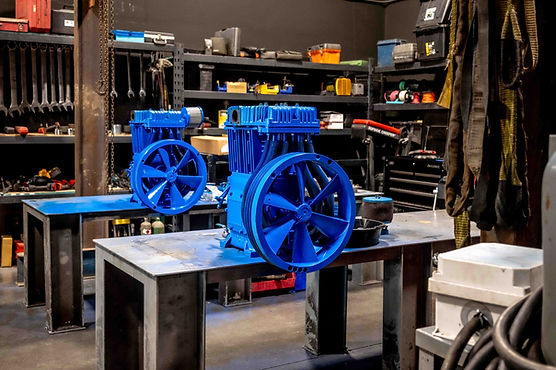
Reciprocating
vs.
Rotary Screw Air Compressors:
Which One Is Right for You?
When it comes to powering industrial and commercial operations, choosing the right air compressor can have a significant impact on efficiency, cost savings, and performance. Two of the most common types of air compressors—reciprocating and rotary screw—serve different purposes and are suited for different applications. Understanding their differences can help you make an informed decision that aligns with your business needs.
What Are Reciprocating Air Compressors?
Reciprocating air compressors, also known as piston compressors, use a crankshaft-driven piston and cylinder mechanism to compress air. These compressors are widely used in small to mid-sized operations that require intermittent air supply.
Advantages:
-
Lower upfront cost compared to rotary screw compressors.
-
Suitable for applications with varying air demand.
-
Simple maintenance with fewer moving parts.
-
Ideal for workshops, small manufacturing units, and auto repair shops.
Disadvantages:
-
Operates at higher noise levels.
-
Requires more frequent maintenance and lubrication.
-
Limited in continuous-use applications due to heat buildup.
What Are Rotary Screw Air Compressors?
Rotary screw air compressors use two meshing helical screws to compress air continuously. These compressors are designed for high-demand applications that require a steady supply of compressed air.
Advantages:
-
High efficiency and continuous operation capability.
-
Lower noise levels compared to reciprocating compressors.
-
Longer lifespan with minimal wear and tear.
-
More energy-efficient for large-scale operations
Disadvantages:
-
Higher initial investment cost.
-
Requires specialized maintenance.
-
Not ideal for low-demand applications.
Key Differences Between Reciprocating and Rotary Screw Air Compressors

How to Choose the Right Compressor for Your Business
Before investing in an air compressor, consider the following factors:
-
Air Demand: If your operations require constant airflow, a rotary screw compressor is the better choice. If air demand is intermittent, a reciprocating compressor will suffice.
-
Budget: If you have a lower initial budget, reciprocating compressors may be more feasible, but long-term operating costs may be higher.
-
Maintenance Capabilities: If you have the resources to handle regular maintenance, reciprocating compressors can work well. If you prefer minimal maintenance, a rotary screw compressor is a better investment.
-
Noise Sensitivity: If noise is a concern in your workspace, rotary screw compressors provide quieter operation.
.jpg)
Choosing between a reciprocating and rotary screw air compressor depends on your specific operational needs.
While reciprocating compressors are cost-effective for intermittent use, rotary screw compressors provide superior performance for continuous applications. If you need guidance in selecting the right compressor for your facility, Industrial Service Components Inc. is here to help! Contact us today for expert advice and customized solutions.
Contact Us Today:
-
📧 Email: sales@iscnow.us
-
📞 Phone: 360-597-3061
-
🌐 Visit: nwindustrialservice.com



